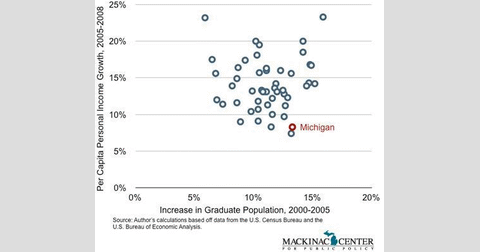Talent Mercantilists Resurrected in Michigan
More college graduates won’t improve state's economy
Two different columns recently called on Michigan to bolster its college graduate population. Unfortunately, this is unlikely to improve the state’s economic situation.
However, it shows that the state has an oversupply of talent mercantilists.
Mercantilism is the discredited idea that all a country needs to do to grow wealthy is to increase its supply of gold and other precious metals. The new talent mercantilists focus not on gold and silver, but instead on increasing a state’s supply of college graduates.
While it’s certainly true that people with college degrees tend to be more employable and have higher incomes, it does not follow that states increasing their college graduate populations will itself lead to greater state prosperity. The chart nearby (click to enlarge) looks at the relationship between increasing a state’s graduate population (on the x-axis) and whether this led to increased personal income (lagged and placed of the y-axis).
Despite the theory espoused by the talent mercantilists, there is no clear connection between grads and growth. (The possibility is further explored here.)
Even if there were a connection between grads and growth, it’s unclear what state policy can do to increase its graduate population. Seeing a degree through to completion is the student’s choice and many choose to drop out (often with large debt). The students who make it to graduation are some of the most mobile people in America. With difficulty in developing and retaining graduates, there seems to be little that policy can do to influence this directly.
It’s better to use tried and true ways of increasing the state’s economic growth: lowering tax burdens, lessening regulation, securing property rights and providing adequate cost-effective infrastructure. These are the basics of the state’s interaction with the private economy. And unlike the ability to develop, attract and retain college graduates, state policymakers directly control these levers.
Michigan Capitol Confidential is the news source produced by the Mackinac Center for Public Policy. Michigan Capitol Confidential reports with a free-market news perspective.


 Michigan manages to lose students while hiking higher ed spending
Michigan manages to lose students while hiking higher ed spending
 Whitmer: Taxpayers should fund community college for all
Whitmer: Taxpayers should fund community college for all
 Trump administration sues Michigan over climate litigation against oil and gas companies
Trump administration sues Michigan over climate litigation against oil and gas companies
Prop 2 Would Change at Least 170 Laws
Gongwer News Service is reporting that proponents of Proposal 2 claim the constitutional amendment “does not repeal a single law or statute.” The wording here is a distinction without a difference: The amendment may not “repeal” laws if it passes, but they would be nullified.
The wording of the amendment reads: "No existing or future law of the state or its political subdivisions shall abridge, impair or limit" unions' ability to "negotiate in good faith regarding wages, hours, and other terms and conditions of employment. … "
Attorney General Bill Schuette listed 170 different laws that would be altered or overridden by the amendment. The lawyer for Proposal 2, Andrew Nickelhoff, didn’t contradict him, telling reporters, "We can guess at how 'Protect Our Jobs' might affect existing legislation and we could spend all day doing that, but in the end, it's just going to have to be decided (in the courts) on a case-by-case basis."
The rest of the group's statement says, "What it does do is make sure that collective bargaining can take place and that broad mandates from the state don't trump decisions reached locally when workers and management come to an agreement about what is best for their workplace."
The problem is that local unions often want provisions that violate state law. That's why the Bay City Public Schools' contract protects drunk and stoned teachers. It is why district after district and city after city is attempting to dodge health care savings. And it’s why Grandville Public Schools lets teachers and local union representatives remove public documents from FOIA requests.
As MEA President Steve Cook puts it: "At any point you find the legislature where they have stepped in and said, 'You can no longer discuss these issues at the bargaining table, [Proposal 2] would overturn that.' "
In short, if Proposal 2 were to pass, a local bargaining unit could agree to a provision that would constitutionally exempt them from complying with existing state laws.
This would effectively mean that local unions would be more powerful than publicly elected state representatives in Lansing. Taxpayers would be forced to keep sending money to local governments and school districts — but their representatives would be unable to pass any law that would ensure it is spent well.
Michigan Capitol Confidential is the news source produced by the Mackinac Center for Public Policy. Michigan Capitol Confidential reports with a free-market news perspective.
More From CapCon